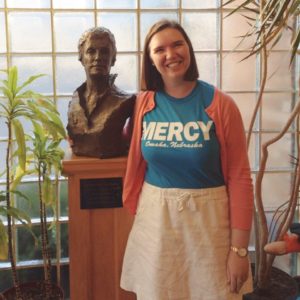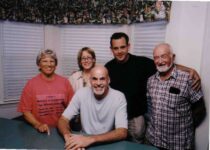As seen in our Annual Report, we invite you to read more about Joe Falco’s…

Practicing Resurrection
It was in the second semester of my senior year that I was assigned to read “Manifesto: The Mad Farmer Liberation Front” by Wendell Berry. One of my favorite professors at Creighton University, Dr. Roger Bergman, often honored his roots as an English major by having his Justice and Peace Studies classes read poems or literature that connected to the theme of social justice. The poem offers two ways of life: one is to follow the status quo and get a job, make a salary and go through the motions and the other is to give oneself to questions and tasks that you will not see to completion.
As a soon-to-be graduate, I had already committed to a year of service with the Mercy Volunteer Corps. Some lines in the poem were instructions that I would quite literally be following in the months to come.
So, friends, every day do something that won’t compute // Love the Lord. // Love the world. Work for nothing. // Take all that you have and be poor.
In a lot of ways my year to come was something that would not compute. I would leave all of my family and friends in Nebraska and move halfway across the country to live with strangers and work for almost nothing.
But now those strangers are my community and the work that I am doing in a community center in the South Bronx has been the most affirming, exhausting, and rewarding of my life.
The final line of the poem prompts the reader to “practice resurrection.” I feel like I am practicing a literal resurrection everyday when I perform the daily miracle of rolling myself out of bed and make the hour long commute from my apartment (also a convent) in Queens to the South Bronx. But I really think that I am “practicing resurrection” when I encounter and accompany another person. Each day I have the opportunity to rise to a better self, a more compassionate heart and patient spirit. At Mercy Center I see resurrections happening all the time. Participants engaged in their ESOL and Family Development classes, my after school students chattering about successes and failures in their classroom, and the staff offering the most humbling hospitality I have ever seen. The triumph of life greets me at work every day.
Some days it is so easy to practice resurrection and other days I fail miserably. Days when I refuse to make eye contact with the individual experiencing homelessness, snap at my students who aren’t listening, or respond to my community members with a harshness they don’t deserve. I truly believe that the work I am doing is benefitting me, the families of Mercy Center, and our community; but when there is so much to do it can be difficult to look beyond the long day ahead of you.
Ask the questions that have no answers. // Invest in the millennium. Plant sequoias. // Say that your main crop is the forest that you did not plant, // that you will not live to harvest.
The best and hardest part of my day is when 25 third and fourth graders bound into my classroom for two and half hours of after school, my 25 beautiful, bright-eyed sequoias and I. I do not know if cheering about every answered math problem makes them feel as smart and affirmed as I hope it does or if asking them about their day makes them feel as heard and cared about as I hope it does. I won’t see what they will become in the future or even as fifth and sixth graders, but I am lucky enough to spend time in the forest that I did not plant.
This year has asked me to invest in the millennium and I’m happy to give it all that I can.
Claudia Brock: New York City, New York




This Post Has 0 Comments